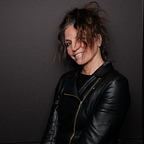My mother used to wear soft knit stretch pants; elastic, a priority for her when selecting something that restricted anywhere along her torso; pinches and cinches were not tolerable at her waistline. Her spine was off balanced, malformed. Her ribcage on the right side pitched higher than on the left. Her up and down back was wonky, left and right on the bias, unjust. This disability affected every system of her body. Physically, psychologically, spiritually, emotionally. She was a hot and bitter mess; she was jig-sawed.
But she didn’t complain, not with language.
She veiled it, disguised herself as calm, tough, steel.
She had dry skin, dry lips, dry thin hair. She had hollowed cheeks and sharp cheekbones. She had large ears. She had bushy eyebrows. She barely wrinkled, not compared to others who reached her old age. The dexterity and skill of plastic surgery tightened the flesh of her face, cleverly seamed her behind the ears. The drooping bags underneath her eyes were cut and mended, smoothed like Vogue, like Gucci luxe. Springtime rose scent followed her everywhere, velvety, musky, ripened pear.
Her legs were slim and long, Maasai-lengthed. When she wore her soft knit stretch pants, she Edie Sedgewick- vibed; she echoed Laura Petrie perfectly. Her frost-tipped hair was choppy short. Her nose was long. Her legs were long, I said that. They called her a long drink of water. I wanted to grow up and be a long drink of water, like her.
I was sad when I learned my father’s ashes were on the floor of the TV room’s closet in my mother’s house on White Bear Lake, in Minnesota. They’d been stored there in a bland bronze urn. It was really heavy; it was hard for me to lift. It had been there for almost a year. I had asked my mother after closing the door to that closet and walking back to where she was sitting with her poodle and her telephone, and her sewing, and her New Yorkers, and her bills and notecards and purses and bitter heart, I asked her, why was dad still on the floor of the TV room’s closet?
I don’t know, was what she had replied.
I made arrangements for his ashes to travel to Martha’s Vineyard. I buried him there. Myself. I met the cemetery’s groundskeeper at the plot he and my mother purchased decades earlier, and where the groundskeeper had dug into and prepped a small grave for an urn the night before. I held the urn. I brought beach stones, and flowers; welcomed the sea I could barely hear over the hill. But I chose to leave the bland bronze urn out of the ground; why bother I thought in that moment. Why wouldn’t I deliver him, his dust and ash and tooth and nail, his melodies and geniuses and the expansive perverseness-es of him, why wouldn’t I return him to the clay and sand and salt and worm and stone and dirt and root, directly? And I did.
It’s amazing the times we live in now. With our phones, which accompany (most of) us everywhere we go, we can photograph, anything; everything. I photographed him, the remains, his dust, there at the bottom of his grave. He was gray and ash. He was white flecked. He had bigger bits and smaller bits. He joined the beginning and became an end. He cycled, through. The photograph was dark, not heavy in levels of light, not colorful. He was quiet.
My mother passed away five years, four months, and two days after my father. She never traveled to his gravesite until a few days ago, when I brought her to meet him there, alongside him, underneath the Japanese Snowbell tree.
I photographed her too, there on Abel’s hill, down the way from our beloved Jungle beach, its unpredictable surf and abiding beauty.
I memorialized her, too, on my iPhone.
And damned if she wasn’t magnificent, vibrant, beyond my experience, golden, gold dust, a galaxy.
